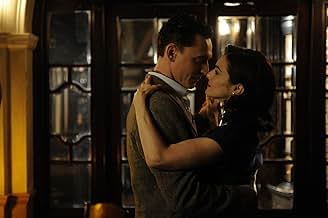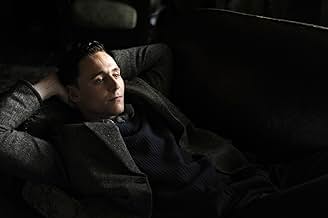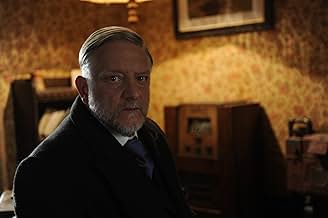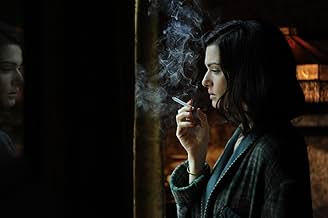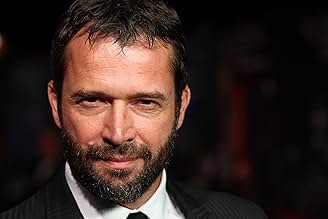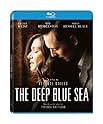IMDb रेटिंग
6.2/10
17 हज़ार
आपकी रेटिंग
एक ब्रिटिश न्यायाधीश की पत्नी एक रॉयल एयर फोर्स पायलट के साथ स्व-घातक प्रेम प्रसंग में फंस गई.एक ब्रिटिश न्यायाधीश की पत्नी एक रॉयल एयर फोर्स पायलट के साथ स्व-घातक प्रेम प्रसंग में फंस गई.एक ब्रिटिश न्यायाधीश की पत्नी एक रॉयल एयर फोर्स पायलट के साथ स्व-घातक प्रेम प्रसंग में फंस गई.
- पुरस्कार
- 5 जीत और कुल 13 नामांकन
Jorge Ojeda-Dávila
- Man in Bunker Bed
- (बिना क्रेडिट के)
Owen Thomas
- Caretaker
- (बिना क्रेडिट के)
फ़ीचर्ड समीक्षाएं
"Love, that's all." (Hester responds to her husband when he asks her what happened.)
No film in recent memory is as depressing as The Deep Blue Sea, Terence Davies' adaptation of Terence Rattigan's play. In either venue, the story of Lady Hester Collyer (Rachel Weisz) and her infidelity will sear your brain in recognition of the perfect storm of love and lust sung to the tune of 1950's conservatism, which largely meant staying with a spouse regardless if it's a loveless marriage.
Freddie (Tom Hiddleston), a WWII Brit flyboy, hasn't graduated yet from the romance of that war to the responsibilities of true love in civilian life. Hester unfortunately is ripe for romance with him as her older husband, a high court judge and a peer, is caring but far too reserved to provide a tender woman with the love she needs.
This is a simple film of measured speech in the tradition of West End thespian greatness. Unlike the orderly upper class, love is not simple but rather messy. In the claustrophobia of her apartments, either beautifully appointed with Sir William Collyer (Simon Russell Beale) or bare with Freddie, Hester is always waiting, either for her husband to love her or her lover to stay with her. Ironically Sir William is waiting, too, with love taking its measure of despair from those who love. As for charming Freddie, he is exuberant, careless, and destructfully self-centered.
Davies and Rattigan intercut between times to make The Deep Blue Sea seem just that: fragmented and deeply melancholic. Yet despite the incoherence, you'll not see a better acting trio this year. Where the play lacks vibrancy or heart, the actors give it their best.
When Freddie consoles Hester upon leaving her with this cliché, "Never too late to start again, isn't that what they say?" he is also hitting the center of her tragedy—she is so passive that this may be the first and last adventure she will ever have.
All that's left is the estranging deep blue sea:
Who ordered that their longing's fire Should be as soon as kindled, cooled?
Who renders vain their deep desire?
A God, a God their severance ruled!
And bade betwixt their shores to be The unplumbed salt, estranging sea.
Matthew Arnold, "To Marguerite—Continued"
No film in recent memory is as depressing as The Deep Blue Sea, Terence Davies' adaptation of Terence Rattigan's play. In either venue, the story of Lady Hester Collyer (Rachel Weisz) and her infidelity will sear your brain in recognition of the perfect storm of love and lust sung to the tune of 1950's conservatism, which largely meant staying with a spouse regardless if it's a loveless marriage.
Freddie (Tom Hiddleston), a WWII Brit flyboy, hasn't graduated yet from the romance of that war to the responsibilities of true love in civilian life. Hester unfortunately is ripe for romance with him as her older husband, a high court judge and a peer, is caring but far too reserved to provide a tender woman with the love she needs.
This is a simple film of measured speech in the tradition of West End thespian greatness. Unlike the orderly upper class, love is not simple but rather messy. In the claustrophobia of her apartments, either beautifully appointed with Sir William Collyer (Simon Russell Beale) or bare with Freddie, Hester is always waiting, either for her husband to love her or her lover to stay with her. Ironically Sir William is waiting, too, with love taking its measure of despair from those who love. As for charming Freddie, he is exuberant, careless, and destructfully self-centered.
Davies and Rattigan intercut between times to make The Deep Blue Sea seem just that: fragmented and deeply melancholic. Yet despite the incoherence, you'll not see a better acting trio this year. Where the play lacks vibrancy or heart, the actors give it their best.
When Freddie consoles Hester upon leaving her with this cliché, "Never too late to start again, isn't that what they say?" he is also hitting the center of her tragedy—she is so passive that this may be the first and last adventure she will ever have.
All that's left is the estranging deep blue sea:
Who ordered that their longing's fire Should be as soon as kindled, cooled?
Who renders vain their deep desire?
A God, a God their severance ruled!
And bade betwixt their shores to be The unplumbed salt, estranging sea.
Matthew Arnold, "To Marguerite—Continued"
I've been putting off review The Deep Blue Sea. Terrence Davies' remake of the 1950′s film based on the stage-play is a curious piece which I'm still struggling to get my head around.
It's a strangely polarising beast which split me between annoyance and er enjoyance
Here's the deal. On the one hand. It's a self-consciously old-fashioned portrayal of love and life in 1950′s London. Rachel Weiss plays Hester trapped in a flat and dull marriage she finds physical and emotional release in the arms of Freddie (played by Tom Hiddleston) a magnetic yet damaged WW2 pilot who is struggling to adjust to post-war life. The story is stylistic lavish with intimate set-pieces, evocative lighting and a mood of emotional frustration. What's not is as important as what is not said. There's evocations of Brief Encounter and Powell & Pressburger. An impressive meditation on love in all its forms and the damage it can cause.
On the other hand. It's an out-dated throw-back from a director who is stuck in time with a Britain that never really existed. Pampered hoity-toity, plummy-types (Hester? Freddie? Oh, 'k off!) moping and whining while the salt of the earth "Cor Blimey" types are just busy getting by. Posh types mope. Look out of windows. Smoke. Mope a bit more. Look out of more windows. Have a bit of a row. Cry. Look out of even more windows. Gah! Hester treats her husband like rubbish. Freddie treats Hester like rubbish. Hester treats herself like rubbish. It's so mannered and drenched in stylistic devices and cinematic tropes that they become at best distracting, at worst like a cinema school project with a budget.
So where does that leave us? Nostalgic meditation on love? Or stylised bore-fest of posh-types gagging for it? To be honest I'm still stuck between a rock and a hard place. Between, the devil and the . hmmm hang-on . it's suddenly occurred to me that maybe that's the point. Christ, I think I need to watch something stupid to clear my brain.
It's a strangely polarising beast which split me between annoyance and er enjoyance
Here's the deal. On the one hand. It's a self-consciously old-fashioned portrayal of love and life in 1950′s London. Rachel Weiss plays Hester trapped in a flat and dull marriage she finds physical and emotional release in the arms of Freddie (played by Tom Hiddleston) a magnetic yet damaged WW2 pilot who is struggling to adjust to post-war life. The story is stylistic lavish with intimate set-pieces, evocative lighting and a mood of emotional frustration. What's not is as important as what is not said. There's evocations of Brief Encounter and Powell & Pressburger. An impressive meditation on love in all its forms and the damage it can cause.
On the other hand. It's an out-dated throw-back from a director who is stuck in time with a Britain that never really existed. Pampered hoity-toity, plummy-types (Hester? Freddie? Oh, 'k off!) moping and whining while the salt of the earth "Cor Blimey" types are just busy getting by. Posh types mope. Look out of windows. Smoke. Mope a bit more. Look out of more windows. Have a bit of a row. Cry. Look out of even more windows. Gah! Hester treats her husband like rubbish. Freddie treats Hester like rubbish. Hester treats herself like rubbish. It's so mannered and drenched in stylistic devices and cinematic tropes that they become at best distracting, at worst like a cinema school project with a budget.
So where does that leave us? Nostalgic meditation on love? Or stylised bore-fest of posh-types gagging for it? To be honest I'm still stuck between a rock and a hard place. Between, the devil and the . hmmm hang-on . it's suddenly occurred to me that maybe that's the point. Christ, I think I need to watch something stupid to clear my brain.
Overindulgent and somewhat stuffy romantic drama that is saved single handedly by the Oscar caliber performance of Rachel Weisz, who gives a very complex and realistic look at a women whose self destructing over her choices in life in post war Britain in the 1950's. Weisz so good that she brings a lot of life into a somewhat lifeless screenplay that is more into atmosphere than substance. Both of her leading men are fine and lent great support to the vibrant Weisz, who is keeping this film afloat almost by herself while the movie gets a bit claustrophobic towards its climax. The film does have some great moments ( The pub scene and the intimate moment between Weisz and leading man Tom Hiddleston while dancing) but that's more the credit to Weisz and the cast than the film itself. Rachel Weisz has always been one of the most gifted and versatile actresses working today, not being afraid to do different characters and being unlikeable and raw in the process. In this film, she gives in my opinion the best female acting performance in the last few years, giving a complex and rich performance with a character that could have easily been botch by even a great actress, especially with a screenplay that is more into itself than the audience watching the movie. Weisz proves in this movie that she's more than a great actress, she proves that she is one of the best actresses we ever had.
Her phenomenal performance alone is the real reason to see this movie.
Her phenomenal performance alone is the real reason to see this movie.
THE DEEP BLUE SEA is set in the 1950′s and flashes back to the War years of the 40′s – so it is appropriate that the title also features in a popular song lyric of the time ' we are all between perdition and the deep blue sea'.
London in 1950 was still very much showing the effects of the War and amid this drab and shattered cityscape, in a small dingy flat, Hester ( Rachel Weisz) has decided to commit suicide using the gas meter, but is revived. Hester had been married to the wealthy but tightly wound Judge, Sir William Collyer, but left him to live with a dashing ex RAF pilot, Freddie Page. The story takes place over a single day about ten months after Hester leaves her husband.
This was originally a Terence Rattigan play that first went to screen in the 1950′s with Vivian Leigh in the lead role and Kenneth More as Freddie and Eric Portman as the stern judge. Rachel Weisz is nothing short of incandescent in the part. She is a polished, accomplished actress who keeps getting better as she goes on. Hester has taken what many would say, a wild and foolish step in leaving her safe and affluent husband for the feckless Freddie and a relationship that while initially passionate, intense and thrilling, is ultimately doomed, as less than a year after the move, Freddie is more centred on drinking in pubs and playing golf while Hester sits forlorn and neglected in a shabby, dingy flat. It is her birthday, Freddie has forgotten. She is alone.
The editing, direction and cinematography are extremely good. Two scenes remain with me for poignancy. In a flashback to the Blitz, Hester and Sir William take shelter in a tube station, huddled with other cold and weary Londoners. Above, the bombs rain down thunderously upon their city, while on the platform, a lone soldier sings 'Molly Malone'. The other has Hester and Freddie dancing in a pub, smoke sits heavy on the air, the light is fractured through the window slats and the Jo Stafford song that was so popular at the time ' You Belong To Me' has the patrons singing with it.
The film was both written and directed by Terence Davies. Perhaps because both Terences ( Rattigan and Davies) were / are gay men, there is a nuanced sympathy for Hester whose life from its start as a Vicar's daughter, through to her marriage to a hidebound upper class man whose mother loathed her as unfit for him, and culminating in her last chance at happiness and love being smashed because Freddie is a shallow and fickle man whose greatest time was as a RAF pilot during the Blitz and he will never move on from that.
A mature, well crafted film, with occasional echoes of BRIEF ENCOUNTER, it has many strong points, but none stronger than Rachel Weisz. 3 and a half stars.. filmnotion.com
London in 1950 was still very much showing the effects of the War and amid this drab and shattered cityscape, in a small dingy flat, Hester ( Rachel Weisz) has decided to commit suicide using the gas meter, but is revived. Hester had been married to the wealthy but tightly wound Judge, Sir William Collyer, but left him to live with a dashing ex RAF pilot, Freddie Page. The story takes place over a single day about ten months after Hester leaves her husband.
This was originally a Terence Rattigan play that first went to screen in the 1950′s with Vivian Leigh in the lead role and Kenneth More as Freddie and Eric Portman as the stern judge. Rachel Weisz is nothing short of incandescent in the part. She is a polished, accomplished actress who keeps getting better as she goes on. Hester has taken what many would say, a wild and foolish step in leaving her safe and affluent husband for the feckless Freddie and a relationship that while initially passionate, intense and thrilling, is ultimately doomed, as less than a year after the move, Freddie is more centred on drinking in pubs and playing golf while Hester sits forlorn and neglected in a shabby, dingy flat. It is her birthday, Freddie has forgotten. She is alone.
The editing, direction and cinematography are extremely good. Two scenes remain with me for poignancy. In a flashback to the Blitz, Hester and Sir William take shelter in a tube station, huddled with other cold and weary Londoners. Above, the bombs rain down thunderously upon their city, while on the platform, a lone soldier sings 'Molly Malone'. The other has Hester and Freddie dancing in a pub, smoke sits heavy on the air, the light is fractured through the window slats and the Jo Stafford song that was so popular at the time ' You Belong To Me' has the patrons singing with it.
The film was both written and directed by Terence Davies. Perhaps because both Terences ( Rattigan and Davies) were / are gay men, there is a nuanced sympathy for Hester whose life from its start as a Vicar's daughter, through to her marriage to a hidebound upper class man whose mother loathed her as unfit for him, and culminating in her last chance at happiness and love being smashed because Freddie is a shallow and fickle man whose greatest time was as a RAF pilot during the Blitz and he will never move on from that.
A mature, well crafted film, with occasional echoes of BRIEF ENCOUNTER, it has many strong points, but none stronger than Rachel Weisz. 3 and a half stars.. filmnotion.com
This film is recommended.
Based on Terence Rattigan's 1952 play, The Deep Blue Sea is stylish soap opera at its best, and an overly ripe melodramatic downer at its worst. The film is reminiscent of the type of films that were popular fare in the fifties. ( And please, don't confuse it with the similarly titled shark attack movie some years back. ) No blood is spilled in this movie adaptation, but many lives are destroyed as loss and suffering does take its toll.
It is post-war Britain. Ruins are everywhere, from the bombed-out buildings to the people who inhabit them. There is a drabness in their hopeless lives, their colorless clothes, and their everyday routines. One such person is Hester Collyer, an unhappy romantic soul, trapped in a comfortable but loveless marriage to Sir William, a wealthy judge. Of course this means only one thing: suicide or an affair is in the offing. Fortunately ( or unfortunately, as the case may be ) after she meets a dashing but lonely RAF pilot named Freddie, there is a temporary respite from her real world. Lust, sin, and passion become the missing strands to her unraveling world ( which is not too surprising when one sees Hester's blatant scarlet red coat that overtly signals a Prynne moment is upon us. No subtlety lost here. Code Red, or is that Coat Read? )
This period melodrama is terribly British with a capital B. All proper diction, words unsaid, and formal reserve. Everyone is so noble and refined. Writer / director Terence Davies evokes the right atmospheric mood as we become lost in Hester's memories. He has a fine visual eye for those bittersweet times and Davies sensitively recalls the aftermath of WWII most efficiently with his use of popular and classical music and strong imagery, especially the impressive Underground bomb shelter scene. After an overly slow beginning, the director paces his film quite well using sounds, silences, and pauses in the characters' reactions to their conversations most effectively in telling his tale of a love undone.
The film sporadically uses these moments to tell the story of the makings of a passionate love affair, but its fragmented structure never allows us to understand Hester's attraction and her rationale to her self-proclaimed changes in her life. She's portrayed as a sympathetic victim, yet this character chooses the very unhappy lifestyle that she now wallows in, and we moviegoers are unable to see the results of her actions. It's as if some parts to her past are missing and sketchy, especially the happier times.
As the damaged Hester, Rachel Weisz is quite smashing. This talented actress fills her slightly underdeveloped role with such clarity and depth. ( Her scene in the pub as she stares into her lover's eyes while becoming uninvolved with the rowdy goings-on during the sing- along of a Jo Stafford tune says more than mere words could have expressed. ) It is a powerful nuanced performance. Completing the love triangle is Simon Russell Beale as her concerned husband and Tom Hiddleston as her cad of a lover. Both actors create indelible contrasting personalities, although the character of Freddie comes off the worst of the pair. Solid support from Ann Mitchell as Hester's landlady and Barbara Jefford is Hester's judgmental mother-in-law round out this wonderful ensemble.
The Deep Blue Sea is a successful throwback to the the great David Lean film, Brief Encounter. Only this time, the encounter is not brief and fleeting, just fleeting. It takes the moviegoer back to a former time, unlike today, when movies had a heart and mind, and dare I say, soul. GRADE: B
NOTE: Visit my movie blog for more reviews: www.dearmoviegoer.com
Based on Terence Rattigan's 1952 play, The Deep Blue Sea is stylish soap opera at its best, and an overly ripe melodramatic downer at its worst. The film is reminiscent of the type of films that were popular fare in the fifties. ( And please, don't confuse it with the similarly titled shark attack movie some years back. ) No blood is spilled in this movie adaptation, but many lives are destroyed as loss and suffering does take its toll.
It is post-war Britain. Ruins are everywhere, from the bombed-out buildings to the people who inhabit them. There is a drabness in their hopeless lives, their colorless clothes, and their everyday routines. One such person is Hester Collyer, an unhappy romantic soul, trapped in a comfortable but loveless marriage to Sir William, a wealthy judge. Of course this means only one thing: suicide or an affair is in the offing. Fortunately ( or unfortunately, as the case may be ) after she meets a dashing but lonely RAF pilot named Freddie, there is a temporary respite from her real world. Lust, sin, and passion become the missing strands to her unraveling world ( which is not too surprising when one sees Hester's blatant scarlet red coat that overtly signals a Prynne moment is upon us. No subtlety lost here. Code Red, or is that Coat Read? )
This period melodrama is terribly British with a capital B. All proper diction, words unsaid, and formal reserve. Everyone is so noble and refined. Writer / director Terence Davies evokes the right atmospheric mood as we become lost in Hester's memories. He has a fine visual eye for those bittersweet times and Davies sensitively recalls the aftermath of WWII most efficiently with his use of popular and classical music and strong imagery, especially the impressive Underground bomb shelter scene. After an overly slow beginning, the director paces his film quite well using sounds, silences, and pauses in the characters' reactions to their conversations most effectively in telling his tale of a love undone.
The film sporadically uses these moments to tell the story of the makings of a passionate love affair, but its fragmented structure never allows us to understand Hester's attraction and her rationale to her self-proclaimed changes in her life. She's portrayed as a sympathetic victim, yet this character chooses the very unhappy lifestyle that she now wallows in, and we moviegoers are unable to see the results of her actions. It's as if some parts to her past are missing and sketchy, especially the happier times.
As the damaged Hester, Rachel Weisz is quite smashing. This talented actress fills her slightly underdeveloped role with such clarity and depth. ( Her scene in the pub as she stares into her lover's eyes while becoming uninvolved with the rowdy goings-on during the sing- along of a Jo Stafford tune says more than mere words could have expressed. ) It is a powerful nuanced performance. Completing the love triangle is Simon Russell Beale as her concerned husband and Tom Hiddleston as her cad of a lover. Both actors create indelible contrasting personalities, although the character of Freddie comes off the worst of the pair. Solid support from Ann Mitchell as Hester's landlady and Barbara Jefford is Hester's judgmental mother-in-law round out this wonderful ensemble.
The Deep Blue Sea is a successful throwback to the the great David Lean film, Brief Encounter. Only this time, the encounter is not brief and fleeting, just fleeting. It takes the moviegoer back to a former time, unlike today, when movies had a heart and mind, and dare I say, soul. GRADE: B
NOTE: Visit my movie blog for more reviews: www.dearmoviegoer.com
क्या आपको पता है
- ट्रिवियाTerence Davies wanted Rachel Weisz for the part of Hester Collyer after he noticed her "incredible talent" in Swept from the Sea (1997), even though he hadn't heard of her before seeing that film. He called his agent and asked, "Have you ever heard of this girl Rachel Weisz?" His agent laughed and said, "She's an Oscar winner!" Weisz was amused by this and said, "I don't think Terence [Davies] knows very well anyone who's not in a black and white film."
- भाव
Freddie Page: Let me give you a case: Jack loves Jill, Jill loves Jack. But Jack doesn't love Jill in the same way. Jack never asked to be loved.
Hester Collyer: And what about Jill?
Freddie Page: That's Jill's hard luck! I can't be bloody Romeo all the time!
- कनेक्शनFeatured in Maltin on Movies: The Watch (2012)
- साउंडट्रैकConcerto for Violin and Ochestra, Op. 14
Composed by Samuel Barber
Published by G. Schirmer, Inc (ASCAP)
Performed by Hilary Hahn & The Saint Paul Chamber Orchestra
Conducted by Hugh Wolff
Licensed courtesy of Sony Music Entertainment Inc.
टॉप पसंद
रेटिंग देने के लिए साइन-इन करें और वैयक्तिकृत सुझावों के लिए वॉचलिस्ट करें
- How long is The Deep Blue Sea?Alexa द्वारा संचालित
विवरण
- रिलीज़ की तारीख़
- कंट्री ऑफ़ ओरिजिन
- आधिकारिक साइट
- भाषा
- इस रूप में भी जाना जाता है
- Dục Vọng Đàn Bà
- फ़िल्माने की जगहें
- उत्पादन कंपनियां
- IMDbPro पर और कंपनी क्रेडिट देखें
बॉक्स ऑफ़िस
- US और कनाडा में सकल
- $11,26,525
- US और कनाडा में पहले सप्ताह में कुल कमाई
- $1,23,841
- 25 मार्च 2012
- दुनिया भर में सकल
- $31,43,514
- चलने की अवधि
- 1 घं 38 मि(98 min)
- रंग
- ध्वनि मिश्रण
- पक्ष अनुपात
- 1.85 : 1
इस पेज में योगदान दें
किसी बदलाव का सुझाव दें या अनुपलब्ध कॉन्टेंट जोड़ें



